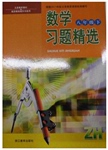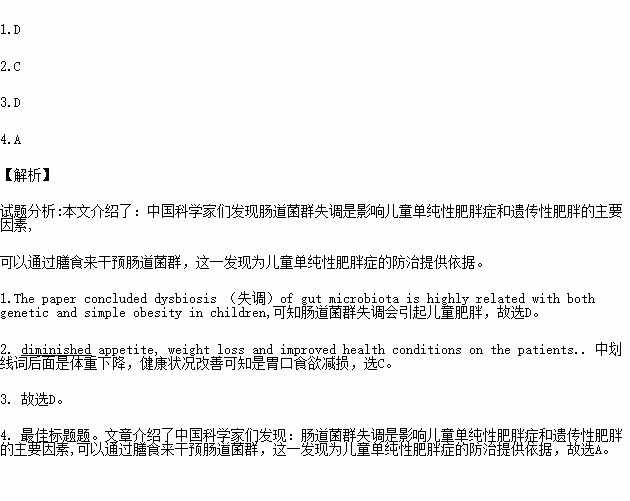题目内容
BEIJING - A research team led by Chinese scientists have discovered dietary modulation of gut microbiota(膳食干预肠道菌群)can alleviate both genetic and simple obesity in children.
The findings of the team, led by Zhao Liping with Shanghai Jiaotong University, Yin Aihua with the Guangdong province children's hospital, and Tang Huiru with Chinese Academy of Sciences, have been published on EBioMedicine, a renowned medical journal co-sponsored by Cell and The Lancet in July.
The team identified bacterial genomes specifically for producing obesity-related metabolites(代谢物), and said an improved gut microbiota can significantly help to treat genetic obesity such as Prader-Willi Syndrome (PWS).
Beginning in childhood, PWS affected kids develop an insatiable appetite, leading to chronic overeating and obesity.
The scientists used a diet therapy with beneficial gut bacteria on trial patients and found considerable diminished appetite, weight loss and improved health conditions on the patients.
The paper concluded dysbiosis (失调)of gut microbiota is highly related with both genetic and simple obesity in children, implicating dietary modulation of gut microbiota a potentially effective treatment method.
1. Which of the following factors contributes to child obesity?
A. dietary modulation of gut microbiota
B. beneficial gut bacteria
C. an improved gut microbiota
D. dysbiosis of gut microbiota
2. Which can replace the underlined word “diminished”?
A. unsatisfied B. increased
C. decreased D. good
3. Where is the passage extracted?
A. Medicine book B. Science book
C. Doctor’s instructions D. News report
4. Which might be the best title for the passage?
A. Chinese scientists discover treatment to child obesity.
B .The reasons for genetic obesity in children has been found.
C. Obesity-related research has been done by Chinese scientists.
D. An effective treatment to obesity has been found.
 习题精选系列答案
习题精选系列答案How to Get Happy
1. Figure out how to change the way you view your lire and you can achieve happiness.
Gretchen Rubin, the creator of the Happiness Project website spent a year testing “every principle, tip, and theory” she could find to help people cheer up, especially given the trying times. “When people feel like they’re worse off than they were last year, it’s a happiness challenge,” Rubin note. Her advice? 2.
Here she happily shared other pointers.
What are the things that give a happiness boost?
Sleep, Sounds boring, but a 2014 study showed tiredness is one of the top two reasons people are in a bad mood at work. Another way to boost happiness is to join or start a group. Philosophers agree that social bonds are the key to happiness. But it’s hard to connect deeply with people at a party; a purpose and an agenda really help. 3. One principle of happiness is that you should always act the way you wish you felt. If you act generously, you’ll feel more secure.
You don’t have to do an extraordinary thing like climbing Mount Kilimanjaro?
No. If you love scrapbooking, maybe you should learn Photoshop; if you like cycling, maybe bike repair. 4. And it should reflect your nature. You can be happier without completely changing your life.
5. A lot of the things I talk about are things that don’t actually take much time, but you have to stick with them-like writing a journal or taking a 20-minute walk every day. People always ask, “Is it hard or is it easy to do fl happiness project?” And I say, “It’s hard in that you have to do it.”
A.Attitude is everything. B.Happiness is a state of mind. C.A third idea is to give something away. D.Always have music and books in your life. E.Is it fair to say that many of your tips require finding a lot of extra time? F.It should be novel(新颖的) and challenging within the framework of what you like to do. G.Try to think ahead five years when, chances are, you’ll have regained your footing and your house will be worth more too. |

